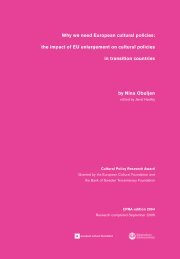Tony Bennett, Differing diversities - Council of Europe
Tony Bennett, Differing diversities - Council of Europe
Tony Bennett, Differing diversities - Council of Europe
Create successful ePaper yourself
Turn your PDF publications into a flip-book with our unique Google optimized e-Paper software.
Reasearch position paper 7It is recommended that <strong>Council</strong> Parties undertake further research to consider:– the viability <strong>of</strong> trade secret models for protecting ITKIP in digital environments,the degree to which violations <strong>of</strong> database confidentiality give rise tolegal recourse, the extent to which such agreements will be respected andrecognised in national and regional patent regimes, and the desirability <strong>of</strong>amending patent law to respect the norms and agreements <strong>of</strong> confidentialitydeveloped by indigenous peoples and traditional communities;– the compatibility <strong>of</strong> the TRIPs Agreement with the suggested requirementsthat, for the purposes <strong>of</strong> establishing novelty, all patent and plant breeders’rights applications include:i. a sworn statement as to the origins <strong>of</strong> genetic resources, as well as anyassociated knowledge, innovations and practices <strong>of</strong> indigenous peoples andlocal communities utilised directly or indirectly in the research anddevelopment <strong>of</strong> the subject matter <strong>of</strong> the patent application;ii. evidence <strong>of</strong> prior informed consent from the country <strong>of</strong> origin and the localcommunity in all applications that involve genetic resources and ITKIP;– the legal and cultural consequences <strong>of</strong> digital dissemination before ITKIP <strong>of</strong> asensitive, sacred, or potentially proprietary character is posted to the Internet;– the emergence and development <strong>of</strong> protocols for indigenous peoples’ and localcommunities’ prior informed consent for Internet postings <strong>of</strong> ITKIP and means<strong>of</strong> respecting such protocols in all Internet activities directly or indirectly supportedby <strong>Council</strong> Parties;– implications <strong>of</strong> various forms <strong>of</strong> confidentiality for local communities andindigenous peoples’ biodiversity and cultural diversity preservation needs;– the potential for distinguishing between kinds and fora <strong>of</strong> publication in ascertainingwhether patentable subject matter has been “anticipated” and the viability<strong>of</strong> introducing exemptions for restricted access indigenous knowledgeregisters and database linkages between local communities as permissibleforms <strong>of</strong> technology transfer in current patent regimes.ConclusionIn conclusion, <strong>Council</strong> Parties’ international legal obligations under environmentaland human rights regimes provide opportunities to ensure that digital technologiesare utilised in a way that serves to preserve biological diversity in a fashionthat simultaneously preserves and revitalises the world’s cultural diversity. Therecommendations for future research contained herein are designed to ensure thatthese efforts are undertaken with full awareness <strong>of</strong> the complexities posed by theneed to balance intellectual property, trade, and environmental considerations withcultural diversity objectives.185














